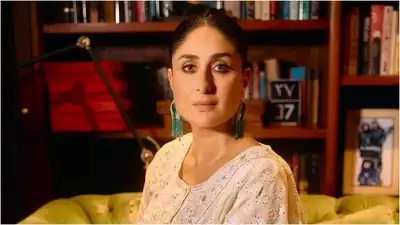Kareena Kapoor Khan, one of Bollywood’s most influential and beloved actresses, recently expressed her elation over the selection of the film Laapataa Ladies as India’s official entry to the prestigious Oscars. The film, helmed by talented filmmakers and featuring a unique storyline, has caught the attention of both audiences and critics alike. In a heartfelt statement, Kareena Kapoor praised the film’s creators and emphasized that “great stories deserve great recognition.” This significant moment has not only propelled Laapataa Ladies into the global spotlight but also highlighted the evolving nature of Indian cinema on the world stage. Let’s dive into the details surrounding this joyous moment for Indian cinema and explore why this film has garnered such widespread acclaim. Kareena Kapoor Khan, a versatile actor with an impressive career spanning over two decades, is well-known for her passion for storytelling and cinema. From Kabhi Khushi Kabhie Gham to Jab We Met and Veere Di Wedding, Kareena has built a reputation for choosing projects that resonate with audiences. As an actress who has witnessed the highs and lows of Bollywood, Kareena’s endorsement of Laapataa Ladies speaks volumes about the film’s potential. While Kareena herself is not part of the Laapataa Ladies cast, her appreciation and vocal support for the film demonstrate her deep love for good cinema. In her statement, she reflected on how films that tell compelling stories often find their way to global recognition. “Great stories deserve great recognition,” she said, celebrating the power of storytelling to transcend borders. Laapataa Ladies is a film that brings to light a poignant and often overlooked issue in Indian society — the plight of women who go missing and the impact it has on their families and communities. Directed by an up-and-coming filmmaker, the film weaves a gripping narrative of two young women from rural India who mysteriously disappear on the day of their wedding. The film sheds light on societal norms, gender roles, and the systemic challenges that rural women face, all while maintaining a gripping emotional core. The plot revolves around the unfolding events after the disappearance of these women, juxtaposing personal loss with larger societal critiques. This film takes a bold and fearless look at a subject that is rarely explored in mainstream Bollywood films, making it a standout for its nuanced portrayal of women and their struggles in Indian society. What sets Laapataa Ladies apart from many other Indian films is its sensitive portrayal of the challenges that rural women in India face. With a focus on both the emotional and psychological toll that these disappearances take on families, the film manages to create a narrative that is both heart-wrenching and socially relevant. Moreover, the film does not shy away from addressing themes like patriarchy, the lack of agency women have in many parts of rural India, and the deep-rooted cultural traditions that often bind them to outdated social norms. Through the characters’ journeys, the film explores these complex themes with empathy, showing the consequences of these disappearances not just on the women themselves, but on the people who love them. The film’s direction, performances, and writing have all been praised for their authenticity and depth. It brings a level of raw realism rarely seen in Bollywood, which often leans towards more glamorous and escapist storytelling. This approach has resonated with audiences who are looking for more socially conscious and thought-provoking cinema.
Kareena Kapoor Khan celebrates ‘Laapataa Ladies’ Oscars selection: ‘Great stories deserve great recognition’
The selection of Laapataa Ladies for the Oscars is a testament to the evolving taste and vision of Indian cinema. Over the years, India has sent numerous films to the Academy Awards, but few have managed to break through to the final nominations. With the selection of Laapataa Ladies, the country hopes to present a fresh and socially resonant story to the world, one that speaks to the challenges faced by millions of women globally. The Oscars are often seen as the pinnacle of recognition for filmmakers worldwide, and India’s journey to the Academy Awards has been filled with both triumphs and disappointments. Films like Lagaan (2001), Mother India (1957), and Salaam Bombay! (1988) have previously made it to the final nominations, but India has yet to secure a win in the Best International Feature Film category. However, the Oscars’ recognition of films like Laapataa Ladies shows a growing interest in stories that are deeply rooted in local realities but have universal appeal. The selection of Laapataa Ladies also signifies a broader trend in the Indian film industry, where stories that were once confined to niche audiences are now finding mainstream acceptance. With platforms like Netflix, Amazon Prime, and international film festivals providing a global stage for Indian filmmakers, the reach of Indian cinema is expanding at an unprecedented rate. Bollywood, once known primarily for its lavish song-and-dance routines and star-studded spectacles, is now diversifying its storytelling approach. The rise of indie filmmakers and films that tackle pressing social issues has been instrumental in this shift. Laapataa Ladies is part of this new wave of cinema that blends commercial appeal with critical depth, making it accessible to a global audience while maintaining its Indian essence. Furthermore, Indian filmmakers are increasingly gaining recognition for their ability to tell culturally specific stories that resonate with global audiences. In recent years, films like Gully Boy, The Lunchbox, and Newton have been lauded for their unique perspectives on life in India, while still addressing universal themes like love, loss, ambition, and social justice. This is a testament to the fact that the language of cinema transcends geographical boundaries, and audiences around the world are eager to engage with authentic and diverse stories. Kareena Kapoor Khan’s advocacy for Laapataa Ladies aligns with her long-standing support for films that highlight women’s issues. Over the years, Kareena has consistently chosen roles that offer strong portrayals of women, whether it’s in Chameli, where she played a sex worker, or Ki & Ka, which explored gender roles in modern relationships.
